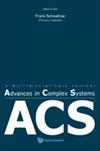是什么让一个充满活力的人口聚集在一起?
IF 1
4区 数学
Q4 MATHEMATICS, INTERDISCIPLINARY APPLICATIONS
引用次数: 1
摘要
对组织和政府来说,管理多样性是一个具有挑战性的问题。种群的多样性可能有两种——后天的和先天的。前者指的是已经存在的社会或组织环境所获得的多样性,因为他们的财富和机会而吸引员工或移民。另一方面,先天多样性指的是预先存在的社区的集合,这些社区必须彼此互动,并建立一个总体的社会或组织身份。后天多样性具有共同身份的先决条件,而先天多样性则需要从许多不同的区域或地方身份中建立一个共同身份。任何大种群的多样性可能有不同程度的后天因素和先天因素。本文分别从孤岛性和同质性两个因素对先天多样性和后天多样性进行建模。孤立性是个体只与来自同一社区的其他个体合作的倾向,这通常是先天多样性的主要挑战;同质性是指个体倾向于选择自己社区的成员来建立新的社会或商业关系,这通常是获得性多样性的主要挑战。研究了孤岛性和同质性变化时网络结构的出现。为了促进多元群体中的合作,我们还研究了不受同质性和孤立性影响的“全局”agent的作用。仿真结果显示了几个有趣的涌现特性。虽然全球代理显示出高度的间接性,但它们绝不是网络中最富有或最强大的。然而,全球代理商的存在对于地区代理商来说是重要的,因为他们自己的财富前景会因为与全球代理商的互动而增加。本文章由计算机程序翻译,如有差异,请以英文原文为准。
What Keeps a Vibrant Population Together?
Managing diversity is a challenging problem for organizations and governments. Diversity in a population may be of two kinds—acquired and innate. The former refers to diversity acquired by pre-existing social or organizational environments, attracting employees or immigrants because of their wealth and opportunities. Innate diversity, on the other hand, refers to a collection of pre-existing communities having to interact with one another and to build an overarching social or organizational identity. While acquired diversity has a prior element of common identity, innate diversity needs to build a common identity from a number of disparate regional or local identities. Diversity in any large population may have different extents of acquired and innate elements. In this paper, innate and acquired diversity are modeled in terms of two factors, namely: insularity and homophily, respectively. Insularity is the tendency of agents to act cooperatively only with others from the same community, which is often the primary challenge of innate diversity; while homophily is the tendency of agents to prefer members from their own community to start new social or business connections, which is often the primary challenge in acquired diversity. The emergence of network structure is studied when insularity and homophily are varied. In order to promote cooperation in a diverse population, the role played by a subset of agents called “global” agents who are not affected by homophily and insularity considerations is also studied. Simulation results show several interesting emergent properties. While the global agents are shown to acquire high betweenness, they are by no means the wealthiest or the most powerful in the network. However, the presence of global agents is important for the regional agents whose own wealth prospects increase because of their interaction with global agents.
求助全文
通过发布文献求助,成功后即可免费获取论文全文。
去求助
来源期刊

Advances in Complex Systems
综合性期刊-数学跨学科应用
CiteScore
1.40
自引率
0.00%
发文量
121
审稿时长
6-12 weeks
期刊介绍:
Advances in Complex Systems aims to provide a unique medium of communication for multidisciplinary approaches, either empirical or theoretical, to the study of complex systems. The latter are seen as systems comprised of multiple interacting components, or agents. Nonlinear feedback processes, stochastic influences, specific conditions for the supply of energy, matter, or information may lead to the emergence of new system qualities on the macroscopic scale that cannot be reduced to the dynamics of the agents. Quantitative approaches to the dynamics of complex systems have to consider a broad range of concepts, from analytical tools, statistical methods and computer simulations to distributed problem solving, learning and adaptation. This is an interdisciplinary enterprise.
 求助内容:
求助内容: 应助结果提醒方式:
应助结果提醒方式:


